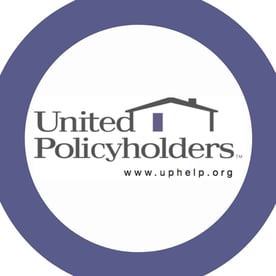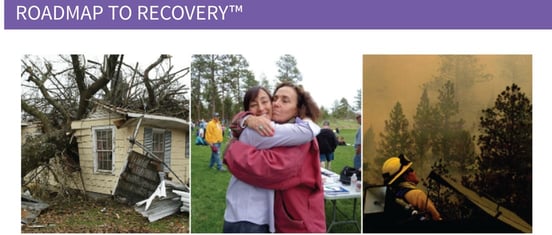In a Nutshell: Insurance is an essential product for those who want to safeguard their property. But the process of understanding and purchasing policies and making claims can be difficult for the average person. United Policyholders provides information and other resources to ensure consumers understand insurance practices and receive fair treatment from providers. That’s everything from shopping and buying policies to making claims and preparing for disasters and emergencies. In those cases, having adequate coverage can be crucial to stability and well-being and avoiding future debt.
In late October 1991, the Tunnel Fire raged for several days in California. Dry conditions, high temperatures, and gusting winds stifled attempts by firefighters to control the blaze.
By the time they managed to get it under control, 2,843 single-family homes had been destroyed, along with 437 apartment and condominium units. Economic losses were estimated at $1.5 billion — a number not adjusted for inflation.
Despite the devastation, Californians rebuilt — but that process also posed challenges, especially for consumers attempting to file insurance claims for losses and damage.

Those difficulties added to the devastation displaced families had already experienced. Out of the ashes of that firestorm came both new infrastructure and the group United Policyholders, a nonprofit organization devoted to educating and supporting insurance claimants.
“We are the voice for insurance consumers, in the media, courts of law, and in the legislature,” said Emily Rogan, Senior Program Officer at United Policyholders. “The insurance industry has a big lobbying and marketing arm, and there are plenty of people who speak up for the insurance companies. But we’re one of the few organizations that give a voice to the policyholder.”
In addition to advocacy, United Policyholders also provides education and resources to insurance consumers, helping them understand policies, claims processes, and everything else relating to the world of insurance. The organization is not an insurer or agency, nor is it affiliated with any insurers.
Its purpose is to provide objective information and guidance to consumers, empowering them to make informed purchasing decisions and get all due value from their policies — rather than resorting to racking up consumer debt when a claims situation arises.
“We’re there to share common problems, make sure people know about them, and tell people what questions to ask their insurance agents,” Rogan said.
Insurance Requires Consumers to Read the Fine Print
Many consumers don’t know exactly what their insurance policies cover, or can define what extended replacement costs are.
Like other legal and financial documents, insurance policies use highly specialized language to precisely define their terms and limitations. However, the tradeoff is that the language and terminology become difficult for the layperson to understand. As a result, consumers may not fully grasp what their insurance covers, let alone how it works. That can be detrimental when shopping for new policies and can lead to debt when certain events are excluded from coverage.
Besides United Policyholders, consumers can turn to other resources when shopping for policies. Some real estate websites now include flood hazard indicators on their listings, and FEMA also offers flood and earthquake insurance resources.
“When you buy insurance, you’re buying a contract,” Rogan said. “You’re buying a big stack of fine print that you agree to at the point of purchase. And so it is a little bit more complicated than your everyday purchases. We try hard to explain what these things are, what matters, and when you’re going to need it.”
Rogan said that every consumer’s starting point should be considering any hypothetical disaster and deciding what the financial responsibility would be. The greater the damage, the higher the cost, and the more vital the need for insurance covering it. The alternative is paying out of pocket, which can lead to costly debt — or worse when that’s not an option.
“It’s going to be different for everybody,” Rogan said. “Some people are going to say, ‘I’m just hoping ‘the big one doesn’t happen.’ And some people are going to say, ‘This is the only home I own, I need to be able to rebuild.’ That might be another reason to consider earthquake insurance or flood insurance: because your home is your biggest asset and you have nowhere else to go.”
Optimize Policies Through the Annual Renewal Process
Ensuring that a policy covers potential disasters and destruction is one component of shopping for a policy. The other is, of course, affordability.
Understanding the balance of premiums and deductibles is crucial in the insurance space. Raising one will lower the other, providing some much-needed flexibility for consumers, but it comes with additional potential costs.
“You can adjust your deductible. If you have a homeowner’s or renter’s policy with a higher deductible, that means that your monthly premiums will go down,” Rogan said. “But if something big does happen, that larger amount is your responsibility to cover.”

The best way to get a good deal on insurance is by comparison shopping. Consumers can find the coverage they need at the lowest price by comparing policies from different insurers.
It is also important to compare the policies, not just the prices. A home insurance policy with a cheaper price tag will almost certainly provide less coverage than a more expensive one. And if you don’t know what you’re buying, you may not be covered when disaster strikes, leading to the need for loans and debt to cover repairs or other expenses.
Insurance policies renew annually, and as the time approaches, it’s an excellent opportunity to examine policies to decide if any costs can be cut. There may be a product on the market that is better suited to specific needs and budgets.
“As long as you’re shopping apples to apples — you’re shopping based on coverage, not based on price — you may find something comfortable for a better price,” Rogan said. “We do discourage people from just trying to shop around for price because, if it’s too good to be true, it probably is.”
Insurance Agents Add Expertise When Exploring Options
Insurance terms and options often make consumers’ heads swim. That’s why a trusted insurance agent or broker can be a great resource.
An insurance broker acts as the client’s representative; he or she shops around on the client’s behalf and finds the best deal on a policy. They can only recommend a policy, though; they cannot sell that policy.
Agents may be bound to a single insurer. An independent broker can and offer products from many different insurers.
“If you go to someone from one of the big-name brands that you usually see on TV, they can usually only sell you a policy from that insurance company,” Rogan said. “An insurance broker may be more helpful if you need help finding replacement coverage if you’ve been dropped by your insurer and have a short amount of time to shop around.”
Insurance brokers and agents are professionals who have built careers in this space. They are familiar with coverage offerings, but a savvy consumer will be sure to make sure there is a written communication that you are relying on their expertise to make sure you are covered for a total loss.
Climate-Related Disasters Require Attention to Risks and the Cost of Rebuilding
When searching for the perfect policy, the most crucial element is consumers knowing what they need. That typically involves seriously contemplating worst-case scenarios. What if a Category 5 hurricane hits my town? What if wildfires sweep through my suburb? What’s the risk of a major earthquake and a resulting tsunami?
These are potential disasters that no one wants to dwell on, but when planning for the future and shopping for insurance, they’re essential questions. Equally essential is knowing if your policy includes them, and if the need is real, ensuring they are covered.
“The optional types of insurance are typically earthquake and flood insurance,” Rogan said. “Those are two pieces that have been carved out of your standard homeowner policies. And so they are these extras that you have to add on.”
Earthquake insurance is obviously more important for residents of California, while hurricane flood and windstorm insurance is more important for a Florida resident than for someone who lives in the Midwest. As California summers get hotter and drier, and as Atlantic hurricane seasons become busier, the need for adequate coverage has never been greater.
Another important consideration is not just repairing a home but rebuilding it in the event of a truly catastrophic disaster. Insurance is based on a home’s value, and the older a home, the more important it is to make sure your limits are enough to rebuild. If an older home succumbs to fire or flood and needs to be rebuilt, your insurance limits need to cover the cost of rebuilding and bringing an older home up to code.
“Underinsurance, or not having enough insurance funds to rebuild, is a national problem. Finding out what it costs to rebuild in your area is important,” Rogan said. “And then work with your insurance agent to set that number as closely as possible to what you think it would cost to rebuild your home from the ground up.”
